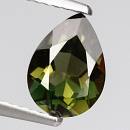|
|
||||||||||||||||
|
||||||||||||||||
|
||||||
|
|
|
|
Kornerupine
|
|
| | |
| Discovered in 1884; IMA status: Valid (pre-IMA; Grandfathered) | ||
|
| ||
|
Chemistry |
|
|
| |
|
(Mg,Fe2+)4Al6(Si,Al,B)5O21(OH) | |
|
|
Magnesium Iron Aluminum Boro-silicate Hydroxide |
|
Molecular Weight: |
734.04 gm |
|
Composition: |
Sodium |
0.03 % |
Na |
0.04 % |
Na2O |
|
|
Lithium |
0.04 % |
Li |
0.08 % |
Li2O |
|
|
Calcium |
0.05 % |
Ca |
0.08 % |
Ca2O |
|
|
Magnesium |
11.52 % |
Mg |
19.11 % |
MgO |
|
|
Titanium |
0.07 % |
Ti |
0.11 % |
TiO2 |
|
|
Aluminum |
24.48 % |
Al |
46.26 % |
Al2O3 |
|
|
Iron |
1.22 % |
Fe |
1.57 % |
FeO |
|
|
Silicon |
14.04 % |
Si |
30.04 % |
SiO2 |
|
|
Boron |
0.46 % |
B |
1.47 % |
B2O3 |
|
|
Hydrogen |
0.14 % |
H |
1.21 % |
H2O |
|
|
Oxygen |
47.93 % |
O |
|
|
|
|
Fluorine |
0.03 % |
F |
0.03 % |
F |
|
|
— |
— % |
F | -0.01 % |
-O=F2 |
|
|
|
100.00 % |
|
99.98 % |
= TOTAL OXIDE |
|
|
|
||||
|
Classification |
|
|
| |
|
Silicates (Germanates) | |
|
8/B.31-10 | |
|
|
9 : SILICATES (Germanates)
|
|
Related to: |
Kornerupine-Prismatine Series. |
|
Varieties: |
None |
|
Synonyms: |
Kornerupite |
|
|
|
|
Crystal Data |
|
|
|
|
|
Crystals prismatic, to over 20 cm, rarely terminated; also as radiating aggregates and distinctly fibrous forms. |
|
|
None |
|
|
|
|
|
Physical Properties |
|
|
|
|
|
Distinct on [110] |
|
|
Irregular/uneven, conchoidal |
|
|
Brittle |
|
|
6.0 - 7.0 |
|
|
3.28 - 3.35 (g/cm3) |
|
|
None |
|
|
Not Radioactive |
|
|
|
|
|
Optical Properties |
|
|
|
|
|
Colorless, white, bluish green, green, dark green, greenish yellow, yellowish brown, black |
|
|
Transparent to translucent and opaque |
|
|
Vitreous |
|
|
1.660 - 1.684 Biaxial ( - ); may be pseudouniaxial ( - ) |
|
|
0.013 - 0.014 |
|
|
r > v or r < v; 0.018 |
|
|
Distinct; X = colorless to green; Y = colorless, pale brownish yellow, pale yellowish green; Z = pale brownish green, green, light amber |
|
|
|
|
|
Occurances |
|
|
|
|
|
Geological Setting: |
In boron-rich volcanic and sedimentary rocks subjected to amphibolite to granulite facies metamorphism; in metamorphosed anorthosite complexes. |
|
Common Associations: |
Sapphirine, Cordierite, Spinel, Corundum, Tourmaline, Grandidierite, Dumortierite, Kyanite, Sillimanite, Andalusite, Biotite, Phlogopite, Magnetite, Ilmenite, Hematite, Rutile |
|
Common Impurities: |
Ti ,Mn, Ca, Li, Na, F |
|
Type Locality: |
Fiskenaes old harbour, Fiskenaes (Fiskenaesset; Qeqertarsuatsiaat), Nuuk (Godthåb), Kitaa (West Greenland) Province, Greenland |
|
Year Discovered: |
1884 |
|
View mineral photos: | |
|
|
|
|
More Information |
|
|
|
|
|
| |
|
|
|
|
Kornerupine was named in 1884 by Danish mineralogist Johannes Theodor Lorenzen (1855-1884) in honor of Danish geologist, Andreas Nikolaus Kornerup (1857-1883). Kornerup died at age 26 from a lung disease he contracted while on an expedition in Greenland. Although Kornerup died at such a young age, he managed to establish himself as a well respected geologist in Greenland research. Coincidentally, Johannes Lorenzen also died at a young age, 29, while on an expedition in Greenland in 1884. Current sources of gem quality crystals are Ivohibe District, Horombe Region, Fianarantsoa Province, Madagascar; Mogok Township, Pyin-Oo-Lwin District, Mandalay Division, Burma (Myanmar); Matara District, Southern Province, Sri Lanka; Lelatema Mts, Simanjiro District, Manyara Region, Tanzania. Kornerupine distribution:
some localities for well-studied material: In Greenland,
at Fiskenæsset. At Bjordam, near Kragerö, Norway. In
Germany, from Waldheim, Saxony. From Mautia Hill, Tanzania.
On the Bok se Puts Farm, Namaqualand, Cape Province,
South Africa. Gem crystals from Itrongahy, near Betroka,
and elsewhere in Madagascar. From gem gravels of the
Matale, Ratnapura, and Embilipitiya districts, Sri Lanka.
In the Harts and Strangways Ranges, Northern Territory,
Australia. At Lac Ste-Marie, Quebec, Canada. |
|
|
We
have not photographed the Kornerupine gems. Please
check back soon. |
